Choosing the best crypto trading platform that meets all of your needs can be a little tricky since some of them might sometimes lack a few features, while others might not be legal in your country. So here’s a comparison between Bitget vs Binance vs BYDFI, three of the best crypto trading exchanges in the industry.
Table of Contents
What is Bitget?
Bitget has a registered office in Seychelles and is based in Singapore. The company has more than 1000 employees and is available in 100 countries.
It is amongst some of the fastest-rising cryptocurrency exchange platforms focusing on leveraged trading. You can trade various pairs with up to 100x leverage and work out your trading while keeping the risk-to-reward ratio in mind.
In addition, their innovative, user-friendly, and highly advanced platform has been designed from the ground up and by using the best-in-class infrastructure to provide traders with the industry’s fastest, fairest, safest, and most transparent trading experience.
Bitget has over 20 million users and is one of the top 5 derivatives platforms by trading volume. The exchange supports an impressive 450 cryptocurrencies.
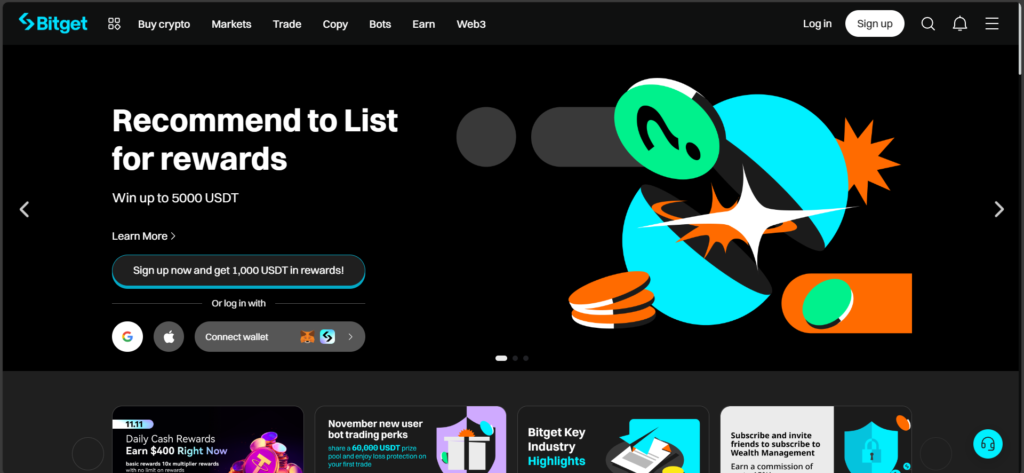
What is Binance?
Binance exchange was established in 2017 and is now among the world’s most reliable and credible cryptocurrency exchange platforms that C.Z. founded, aka Changpeng Zao.
Initially, this exchange was situated in China, but later it was moved from there because of strict cryptocurrency laws in China.
Traders can enjoy the unique and advanced services and products offered by Binance Exchange, such as Binance Labs, Binance Visa Card, Binance Smart Pools, and much more.
In addition to this, it is a one-stop shop for purchasing and selling cryptos, cryptocurrency trading, earning interest, crypto loans, liquid swaps, and many more things.
To learn more, you can head over to the Binance review.
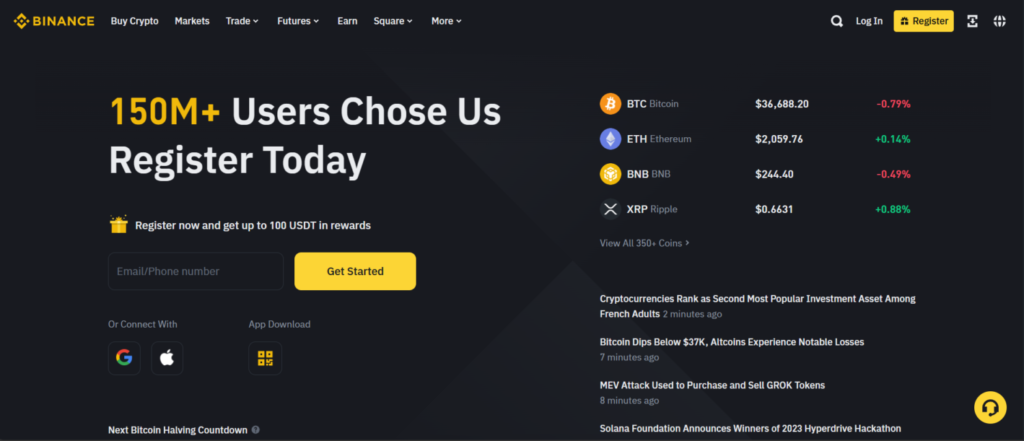
What is BYDFI?
BYDFI Exchange is a premier cryptocurrency trading platform based in Singapore, having been operational since 2019. With a global reach of nearly 150+ countries and 500,000+ users , its traders can trade across borders.
The BYDFI platform believes in the concept of “Complex contract simple trade.”
Moreover, it provides all traders with Multiple licenses, easy deposit and withdrawal features, service diversification, copy trading options, and many others.
by providing traders from all over the world with a convenient and user-friendly interface. Additionally, a beginner’s guide is available on the website to assist those who are new to trading. To Gain an in-depth understanding, read–> BYDFI Review
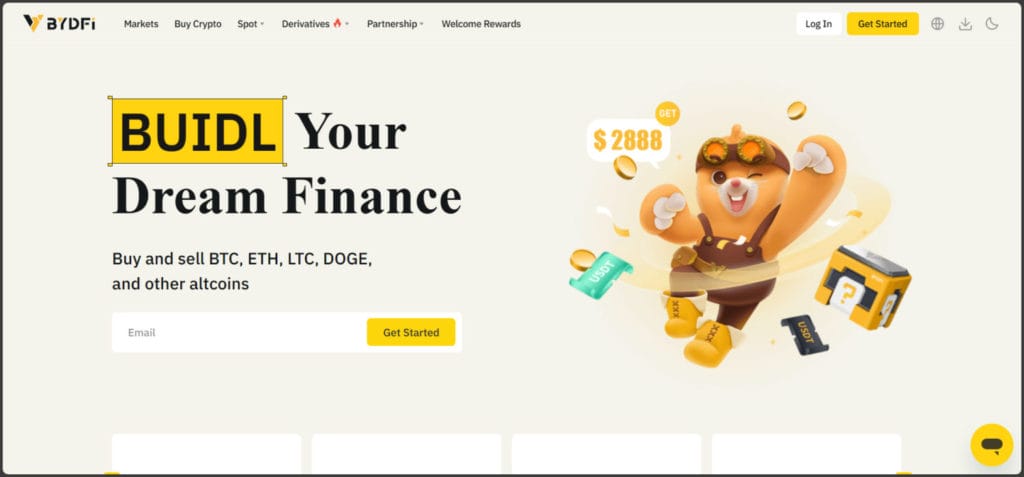
Features: Bitget vs Binance vs BYDFI
Bitget Features
- Spot Trading
- Bitget likely supports spot trading, allowing users to buy and sell various cryptocurrencies directly.
- Futures Trading
- Many platforms, including Bitget, provide futures trading options, enabling users to trade cryptocurrency contracts with leverage.
- Perpetual Contracts
- Similar to futures, perpetual contracts allow users to trade cryptocurrency contracts with no expiration date.
- Margin Trading
- Bitget may offer margin trading, allowing users to borrow funds to increase their trading position size.
- Leverage
- Leverage is the ability to control a large position in the market with a relatively small amount of capital. Bitget likely provides leverage options for traders.
- Multiple Cryptocurrencies
- Bitget supports the trading of various cryptocurrencies, including popular ones like Bitcoin, Ethereum, and others.
- User Interface
- A user-friendly interface is crucial for traders. Bitget likely has a well-designed platform with features such as advanced charting tools, order types, and real-time market data.
- Security Measures
- Security is a top priority for cryptocurrency exchanges. Bitget likely implements security measures such as two-factor authentication (2FA) and encryption to protect user accounts and funds.
- Mobile App
- Many exchanges offer mobile apps to allow users to trade on the go. Bitget may have a mobile app compatible with iOS and Android devices.
- Educational Resources
- Some platforms provide educational resources such as tutorials, articles, and webinars to help users understand trading concepts and market dynamics.
- API Access
- For advanced traders, API access allows for automated trading and the development of custom trading strategies.
- Some platforms provide educational resources such as tutorials, articles, and webinars to help users understand trading concepts and market dynamics.
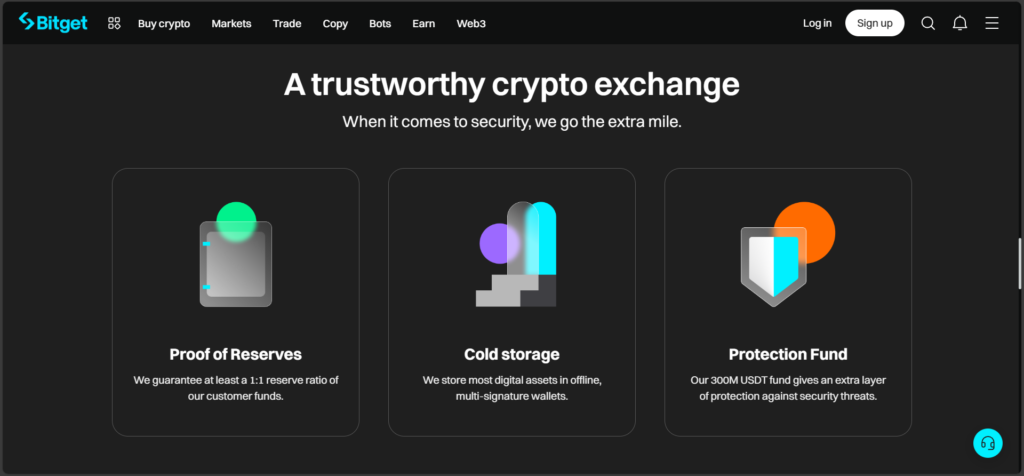
Binance Features
- Charting Options
- Binance provides extensive charting options with indicators and overlays for comprehensive market analysis.
- Order Types and Trading Options
- Supports a variety of order types including limit orders, market orders, trailing stop orders, post-only orders, stop-limit orders, and peer-to-peer trading.
- Trading limits vary based on the specific cryptocurrency being exchanged.
- Public API Keys
- Traders have access to Public API keys, facilitating integration with other software tools.
- Binance Advanced
- Advanced trading platform for more experienced traders.
- Allows access to detailed statistics for in-depth market analysis.
- Binance Convert
- Enables quick conversion between different cryptocurrencies in a matter of seconds.
- Binance Classic
- Traditional platform providing standard access to charts.
- Easy-to-use and intuitive interface for all traders.
- Margin Trading
- Binance margin trading allows traders to borrow funds for leverage trading.
- Supports both Cross Margin and Isolated Margin modes for risk management.
- Binance Earn
- Traders can lend funds, deposit in DeFi services, and stake PoS coins via Binance to earn interest on their crypto holdings.
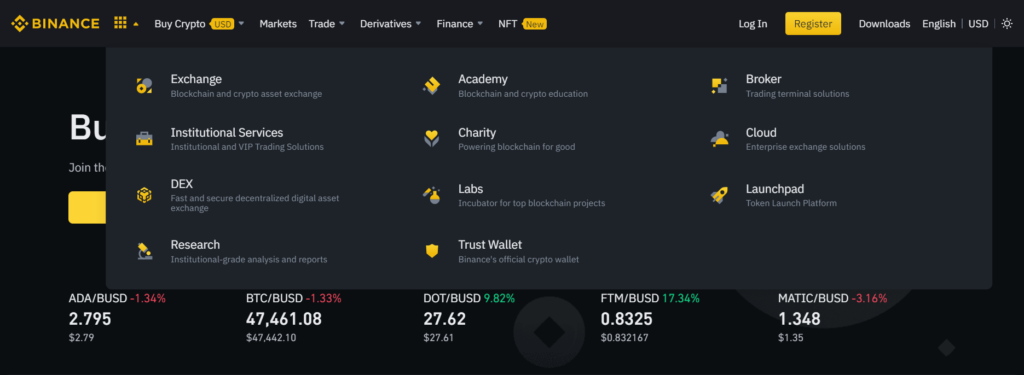
BYDFI Features
- Simplified Trading: BYDFI focuses on providing a straightforward trading experience with user-friendly tools.
- Quick Registration: Traders can register in just 30 seconds using their email or mobile number.
- Global Presence: Available in 150+ countries since its debut in 2019.
- Multilingual: Supports eight languages, enhancing accessibility for traders worldwide.
- Cryptocurrency Variety: Offers trading in numerous cryptocurrencies with leverage options up to 125x on crypto and 200x on derivatives. Furthermore, read our guide to BYDFI margin trading to understand things better.
- BYDFI Coin Benefits: Trading with BYDFI coin (BYD) reduces fees and offers extra rewards.
- Security Measures: Implements strong security, including multiple signatures and cold storage.
- KYC Authentication: Mandatory to ensure trader safety.
- Copy Trading: Allows users to learn from experienced traders and maximize profits.
- Welcome Bonus: Offers a welcome bonus of up to $258 for new sign-ups.

Coins Supported: Bitget vs Binance vs BYDFI
- Bitget : It offers over 500+ cryptocurrencies to trade.
- Binance: It has 400+ cryptocurrencies available to trade.
- BYDFI: It has more than 400 crypto-USDT pairs available for spot trading
Fee Structure: Bitget vs Binance vs BYDFI
Bitget Fees
At Bitget, it’s essential to divide between spot buying and selling and contract trading. Concerning the spot buying and selling, both the makers and the takers pay the exact price: 0.20%. This rate is decreased to 0.14% if you pay the trading prices with the exchange’s local token, the Bitget DeFi Token (BFT).
Withdrawal Fees
Bitget withdrawal fees are percentage-based which is 0.05%. For more details, you can refer to the table below:
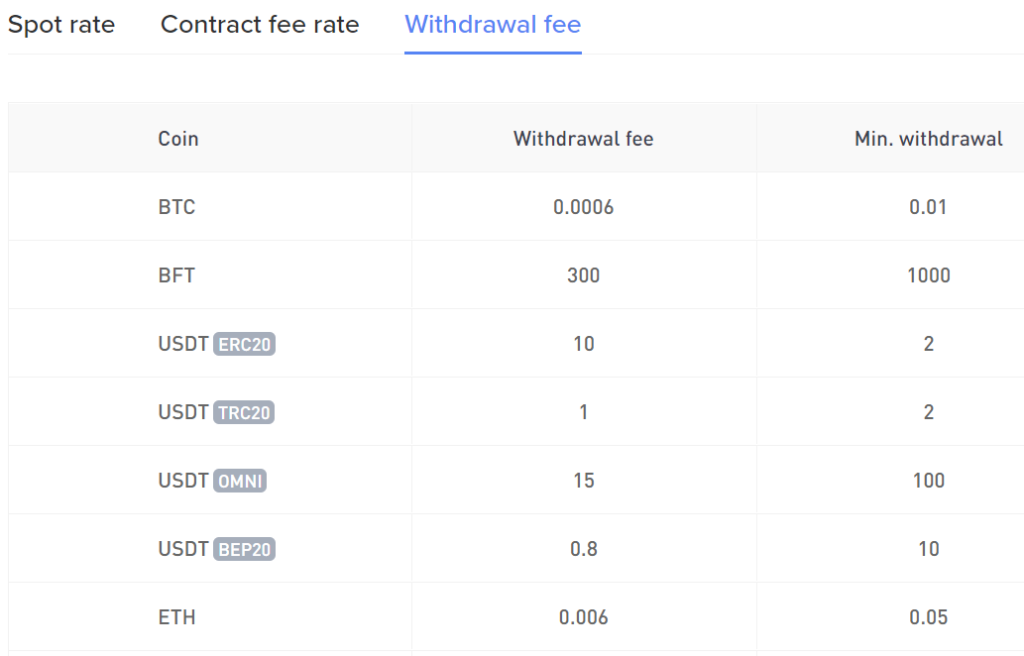
Binance Fees
Binance withdrawal fees and minimum withdrawal amount depend on the blockchain network. Hence, they depend on network congestion and are not fixed. The platform uses a maker and taker model.
The pricing structure of the platform is divided into eleven levels according to the BNB balance and trading volume in the last thirty days. Hence, traders’ trading fee is decided by their level.
Moreover, they update BNB Balance every day at 0:00 am UTC and the trading volume over thirty days for all their users.
The tier level maker and taker fees are updated at around 2:00 UTC. Furthermore, the platform deducts the trading fee from your BNB balance by default with a 25% discount.
Also read, Binance Fees: Complete Guide (For Binance and Binance US)
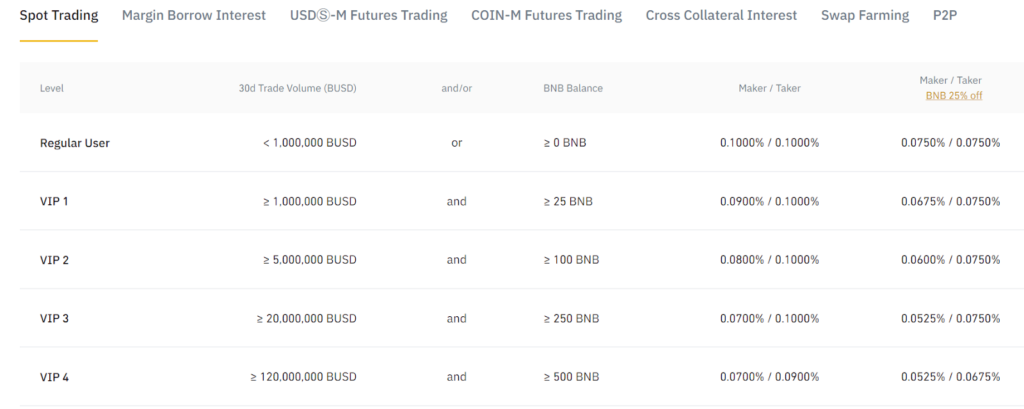
BYDFI Fees
The spot handling fee is as follows:
- BYDFI charges 0.1% as the maker’s fee.
- Similarly, it charges 0.1% as the taker’s fee.
- The conversion fee is 0.1%.
Similarly, for CFDs:
- The transaction fee varies from 0.075% to 0.05%.
- The price of opening/closing position can be calculated as follows: margin * leverage * 0.05%
- BYDFI charges 0.1% when opening a position.
For Derivatives:
- The opening/closing fee can be calculated as follows: margin * leverage * 0.025%
- BYDFI charges 0.05% when opening a position.
- To know the entire fee structure, visit the BYDFI help center.
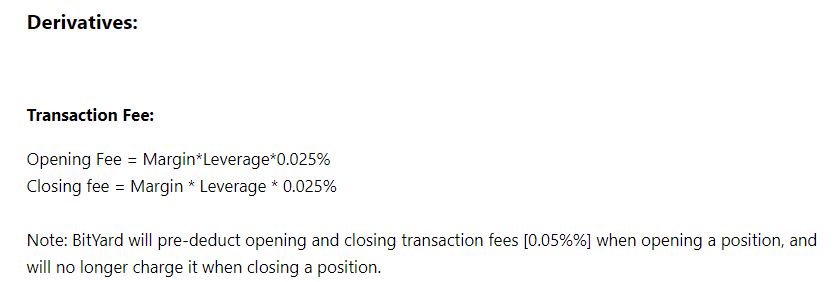
Security: Bitget vs Binance vs BYDFI
Bitget
- Two-factor authentication (2FA)
- Bitget likely supports two-factor authentication to add an extra layer of security to user accounts. 2FA usually involves using a mobile app or receiving a code via SMS to confirm logins.
- Cold Storage
- Cryptocurrency exchanges often use cold storage for the majority of user funds. Cold storage keeps digital assets offline, making them less susceptible to hacking attempts.
- Encryption
- The exchange likely employs encryption protocols to secure the transmission of data between users and the platform. This helps protect sensitive information from unauthorised access.
- Withdrawal Whitelists
- Users may have the option to set withdrawal whitelists, specifying a list of addresses to which withdrawals are allowed. This adds an extra layer of protection against unauthorised withdrawals.
- Regular Security Audits
- Reputable exchanges conduct regular security audits to identify and address potential vulnerabilities. These audits may be performed by internal security teams or third-party cybersecurity firms.
- Distributed Denial of Service (DDoS) Protection
- DDoS attacks can disrupt the normal functioning of an exchange. Bitget likely has measures in place to mitigate the impact of such attacks and ensure uninterrupted service.
- User Education
- Bitget may provide educational resources to help users enhance their awareness of security best practices. This could include guidelines on setting strong passwords, recognizing phishing attempts, and using security features effectively.
- Insurance Fund
- Some exchanges have insurance funds to cover potential losses in the event of unexpected market volatility or system issues. This fund can help compensate users in certain situations.
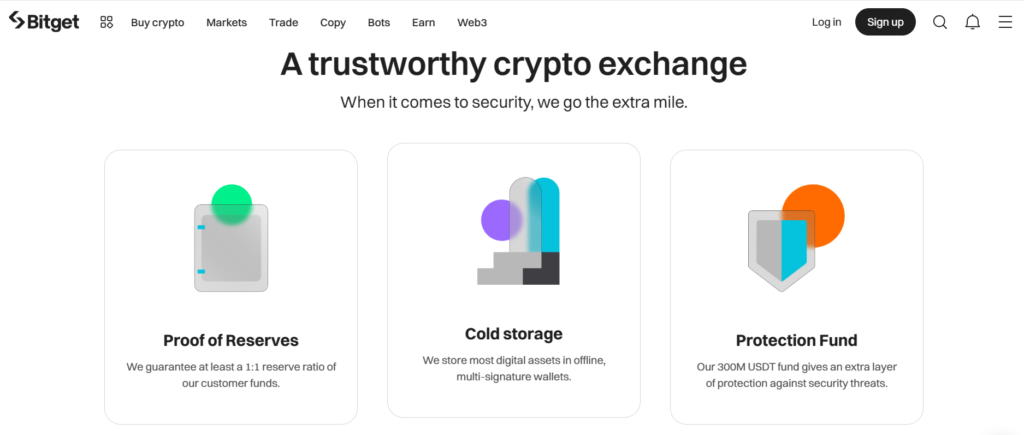
Binance
- Two-factor authentication (2FA)
- Binance encourages users to enable 2FA to add an extra layer of protection to their accounts. This typically involves using an authentication app or receiving codes via SMS.
- Cold Storage
- The majority of user funds on Binance are stored in cold wallets, which are offline and less susceptible to hacking attempts compared to hot wallets.
- Withdrawal Whitelists
- Users can set withdrawal whitelists, specifying a list of addresses to which withdrawals are permitted. This adds an additional layer of security to prevent unauthorized withdrawals.
- Anti-Phishing Code
- Binance provides users with an anti-phishing code during the registration process. This code is used to verify communications from Binance and helps users avoid phishing attempts.
- API Security
- For users who utilize Binance’s API for trading, the platform provides features like API key permission settings and IP whitelist restrictions to enhance security.
- Security Audits
- Binance conducts regular security audits to identify and address potential vulnerabilities. They may employ internal security teams and collaborate with external cybersecurity firms.
- Binance SAFU Fund
- Binance has a Secure Asset Fund for Users (SAFU) to cover unforeseen losses. This fund is designed to compensate users in extreme situations, though it may not cover all types of losses.
- Distributed Denial of Service (DDoS) Protection
- Binance implements measures to mitigate the impact of DDoS attacks, ensuring the exchange remains operational even during periods of high traffic.
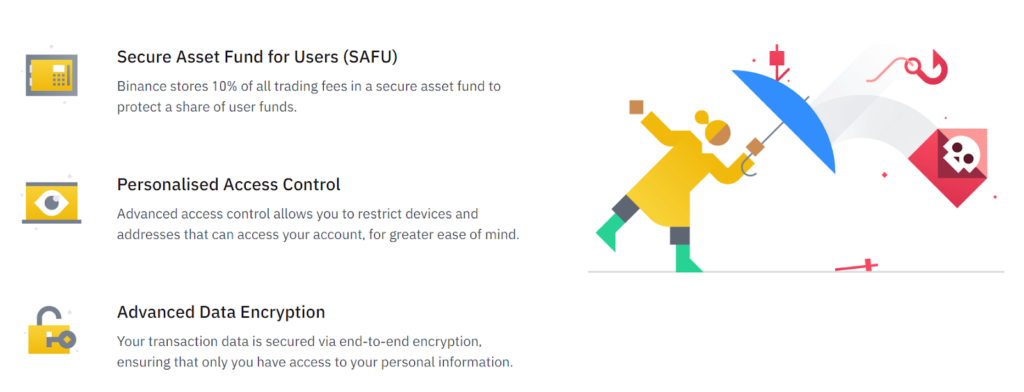
BYDFI
1. Multi-Layered Verification: BYDFI employs 2FA and KYC verification to enhance account security.
2. Cold Storage: Digital user assets are stored in offline deep cold storage wallets, minimising the risk of online theft.
3. Regulatory Compliance: BYDFI is licensed and regulated by multiple authorities, including AUSTRAC (Australia), ACRA (Singapore), MTR (Estonia), and MSB (United States).
4. Security PIN: Traders are encouraged to set up a security PIN for fund withdrawals, ensuring only authorised users can access their accounts.
5. SMS Authentication: Essential account changes, like password resets, require SMS authentication to prevent unauthorised access.
6. Email Verification: Important tasks, such as withdrawals and password resets, necessitate email verification for added security.
7. Login Records: BYDFI keeps login records to detect and address unauthorised access attempts.
8. SSL Encryption: The platform uses SSL encryption for secure communication, safeguarding user data and transactions
9. Multiple Wallets: BYDFI maintains multiple offline wallets to secure user assets effectively.
10. Strong Reputation: With a track record of security measures, BYDFI has earned a reputation as a safe, legitimate, and reliable trading platform.
These security features collectively ensure the safety of user assets and data on the BYDFI platform, reducing the risk of fraud and online theft.
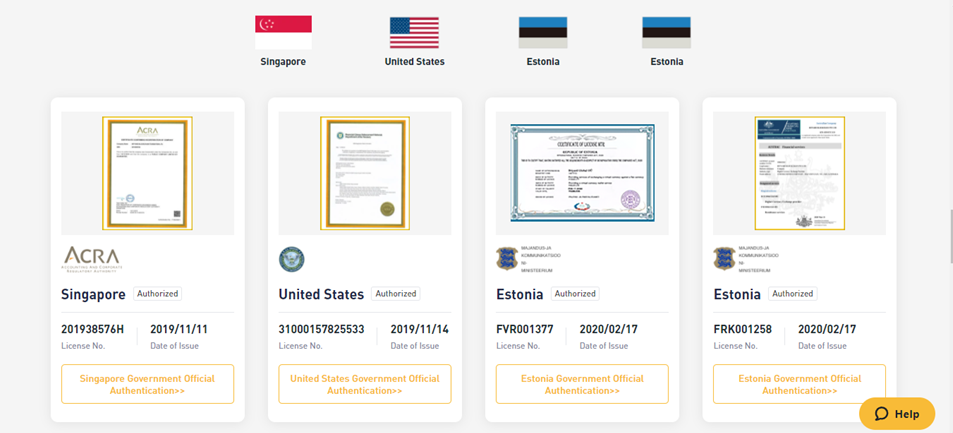
Customer Support: Bitget vs Binance vs BYDFI
Bitget
- Online Support Center
- Bitget likely has an online support centre or knowledge base that contains frequently asked questions (FAQs) and guides. Users can often find information on topics ranging from account security to trading instructions.
- Customer Support Tickets
- Users can typically submit support tickets through the Bitget website. This allows users to report issues, ask questions, or seek assistance with specific concerns. Bitget support staff may respond to these tickets to address user queries.
- Live Chat
- Bitget may offer live chat support for real-time assistance. Users can communicate directly with support agents to resolve issues or get answers to their questions promptly.
- Email Support
- Users may have the option to contact Bitget’s customer support via email. This is typically useful for more detailed or specific inquiries, and the support team will respond accordingly.
- Social Media Channels
- Cryptocurrency exchanges often maintain official social media channels, including Twitter and Telegram. Users can follow these channels for updates, and announcements, and sometimes support-related inquiries are addressed there as well.
- Phone Support
- Some exchanges, including Bitget, may provide phone support for urgent matters. Users can find the relevant contact information on the official website.
Binance
- Online Support Center
- Binance usually has an online support center that contains a comprehensive knowledge base with frequently asked questions (FAQs) and guides. Users can often find information on topics ranging from account security to trading on the platform.
- Customer Support Tickets
- Users can typically submit support tickets through the Binance website. This allows users to report issues, ask questions, or seek assistance with specific concerns. Binance support staff may respond to these tickets to address user queries.
- Live Chat
- Binance may offer live chat support for real-time assistance. Users can communicate directly with support agents to resolve issues or get answers to their questions promptly.
- Email Support
- Binance users may have the option to contact customer support via email. Users can send detailed messages explaining their concerns, and the support team will respond accordingly.
- Social Media Channels
- Binance often maintains official social media channels, including Twitter and Telegram. Users can follow these channels for updates and announcements, and sometimes support-related inquiries are addressed there as well.
- Phone Support
- Some exchanges, including Binance, may provide phone support for urgent matters. Users can find the relevant contact information on the official website.
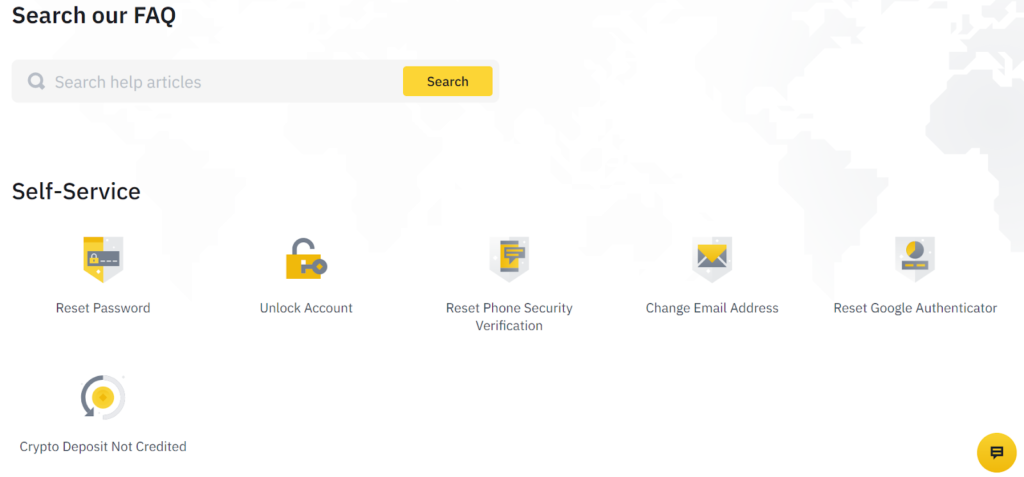
BYDFI
- Multiple Contact Channels: BYDFI offers various ways for users to contact customer support, including live chat, messaging, and email.
- 24/7 Availability: Customer support is available 24/7, ensuring assistance at any time.
- Live Chat: Users can connect with support agents via a live chat feature, conveniently located on the website.
- FAQ Section: BYDFI provides a separate FAQ section and a help center for quick answers to common queries.
- Comprehensive Guides: Users have access to comprehensive guides that offer solutions to general problems and concerns.
- Email Support: Users can reach out to customer support via email at [email protected], providing details of their issues.
- Telegram and Online Support: BYDFI features Telegram and online support options, including a live bot for immediate assistance.
- This customer support features ensure that BYDFI users have multiple channels to seek help and find solutions to their questions and issues.
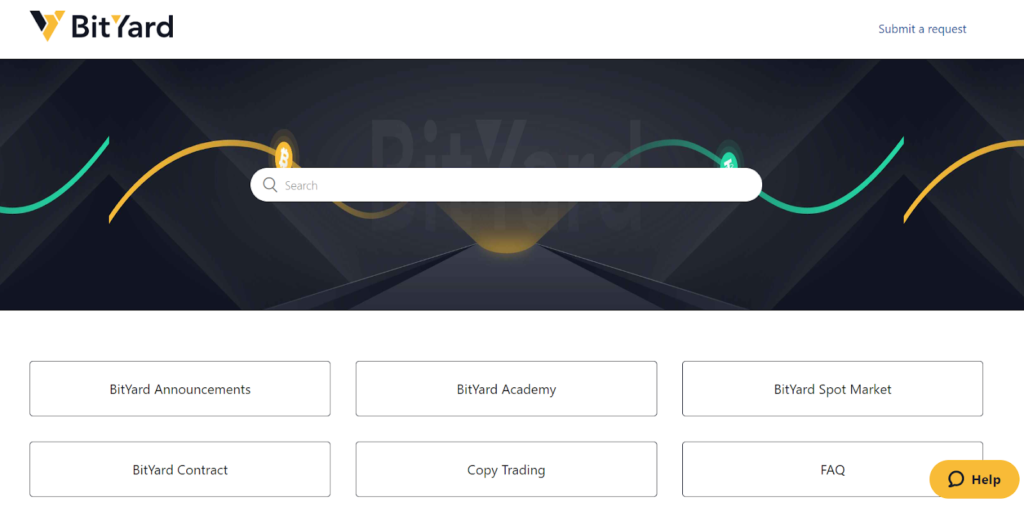
Mobile App: Bitget vs Binance vs BYDFI
Bitget App
Bitget mobile app is somewhat similar to the web app and provides almost all of the platform’s features. So keeping it handy, you can surely opt for the mobile app instead, as it is available for both Android and iOS users.
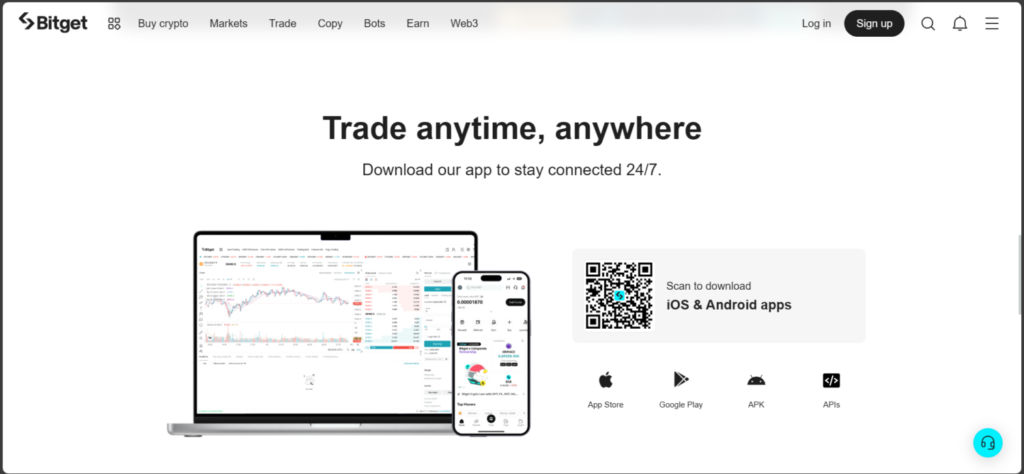
Binance App
Binance exchange welcomes the world to the most renowned cryptocurrency platform by trading volume through their mobile app.
The Binance app is only available to non-US citizens and residents. However, U.S. citizens and residents must install the Binance.US application.
Moreover, the Binance app’s mobile-first design lets traders switch between Lite and Pro interfaces with just a single tap.
The app is simple, yet it has access to all the advanced trading features. In addition to this, it is available for Android, iOS, Windows, and Linux devices.
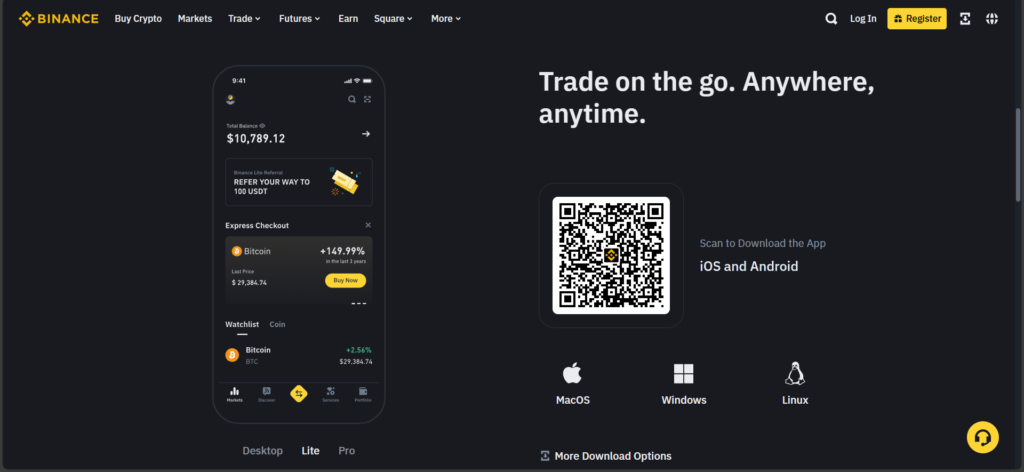
BYDFI App
The BYDFI mobile app is available for both Android and iOS devices, offering a user-friendly interface for traders to access trade charts, monitor positions, and place orders. It provides 24/7 customer support and the convenience of copy trading, allowing users to analyse the cryptocurrency market from anywhere. You can download the app from the App Store or Play Store, making it accessible to both iOS and Android users.
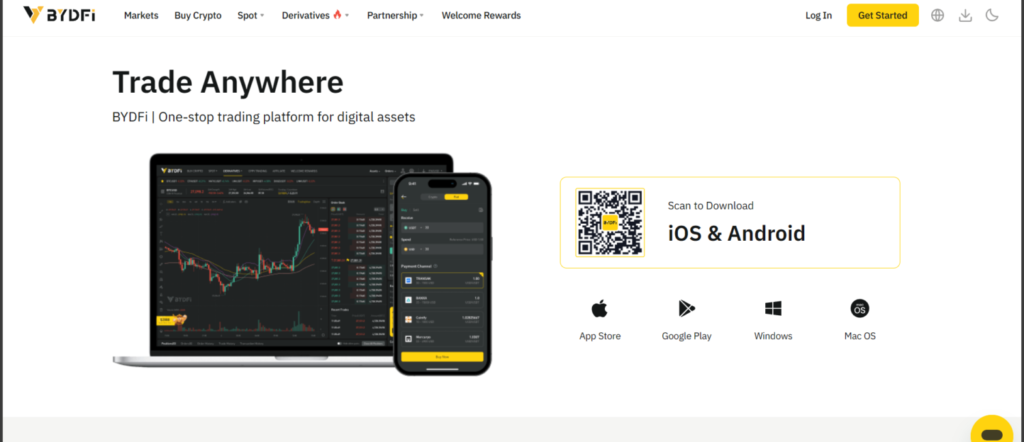
Pros and Cons:Bitget vs Binance vs BYDFI
Bitget
Binance
| Pros | Cons |
| There is a wide variety of cryptocurrencies available. | The customer support system is not that strong. |
| Binance exchange has lightning-speed processing. | Binance can sometimes be a bit overwhelming to traders as it has a variety of features. |
| It has high liquidity. | Binance UI could have been a bit more interactive and appealing to eyes. |
| There are several payment options available for the traders. |
BYDFI
| Pros | Cons |
| It has the quickest trading engine, with 1 million transactions per second. | Beginners may find the platform confusing and require research. |
| More than 65 supported cryptocurrencies in the US. | Binance doesn’t offer built-in wallets |
| Low trading fee. | 3. There have been regulatory issues in many countries. |
| The platform supports deposits and withdrawals using fiat money and cryptocurrency. | Fiat currency deposit is only supported in Vietnam, Mainland China, and Indonesia. |
Conclusion
In conclusion, Bitget, Binance, and BYDFI are all prominent cryptocurrency exchanges with distinct features and offerings.
Bitget is a game-changer because it’s got a cool Unified Contract feature, super low fees, and a super easy-to-use platform. Plus, you can follow experienced traders and use a copy trading option.
Binance is one of the biggest exchanges in the world, and it’s easy to see why – it’s got a ton of different cryptocurrencies, lots of liquidity, and super fast processing. But it can be a bit overwhelming for some people, and there’s also been some complaints about customer support.
Based in Singapore, BYDFI focuses on a user-friendly trading experience, fast registration, and global reach. ByDFI supports multilingual trading, leveraged trading, and strong security features such as multi-layer verification, cold storage, and more.
When choosing among these exchanges, users should consider factors such as the variety of supported cryptocurrencies, trading fees, security measures, customer support, and the overall user experience. Each platform has its strengths and weaknesses, catering to different preferences and trading styles.
Which platform offers more cryptocurrency options Binance or Bitget?
Both Binance and Bitget offer a wide range of cryptocurrencies for trading. However, Binance has a larger selection and consistently adds new cryptocurrencies to its platform.
Can I earn passive income on Bitget?
No, Bitget does not currently offer passive income opportunities like yield farming or liquidity mining. It primarily focuses on cryptocurrency trading and related services.
Is BYDFI a decentralized platform?
Yes, BYDFI operates as a decentralized finance platform. It leverages smart contracts and blockchain technology to provide transparent and secure financial services, eliminating the need for intermediaries.
Which exchange focuses most on security?Bitget or Binance or BYDFI
BYDFI focuses most on security out of the three exchanges, with features like multi-layer verification, SMS authentication, cold storage, and regulatory compliance across several jurisdictions.
What types of fees does Bitget charge?
Bitget charges 0.2% for spot trades, which is reduced to 0.14% if paying in BFT tokens. Withdrawal fees are percentage-based around 0.05%.









